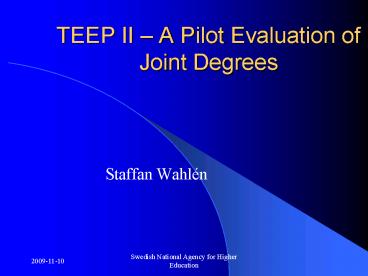TEEP II A Pilot Evaluation of Joint Degrees PowerPoint PPT Presentation
1 / 20
Title: TEEP II A Pilot Evaluation of Joint Degrees
1
TEEP II A Pilot Evaluation of Joint Degrees
- Staffan Wahlén
2
TEEP II
- Transnational European Evaluation Project
- Aim to develop a methodology for external
evaluation of joint Masters degrees - Evaluates three programmes
- CoMundus Media and Communication
- EMLE European Master in Law and Economics
- EuroAquae Water Management
3
Three different programmes
- Length Comundus 3 semesters (90 ECTS)
- EMLE 1 year (60 ECTS)
- EuroAquae 2 years (120 ECTS)
- Coherence CoMundus 4 main areas, 2 locations
- EMLE 2 main areas, 2 3 locations
- EuroAquae different specialities, 3 locations,
professional practice
4
Three different programmes
- Number of partners
- CoMundus 7
- EMLE 10
- Euroaquae 5
- Age
- CoMundus since early nineties
- EMLE since late 80s
- Euroaquae new
5
Joint European project
- Involves six quality assurance agencies
- Programmes involving five countries each, a total
of nine - Experts from a total of ten different countries
- Based on the European standards and guidelines
- Criteria inspired by the Dublin descriptors and
the EUA Golden Rules
6
Evaluation process
- European Standards and Guidelines
- - Self-evaluation
- - Team of experts (peers)
- - Site visit
- - Public report
- - Follow-up
7
Organisation and management
- Both professional and academic aims
- Different levels of institutional support
- Different mechanisms for cooperation, information
sharing - Student support services
- Different conditions for EU students and non-EU
students
8
Programme and programme delivery
- The international environment provides added
value and personal development - Harmonisation of teaching and assessment methods?
Common textbooks exams? - Common core diversification?
- Computer based learning platforms
- Staff development and exchange
9
Quality assurance
- Joint quality assurance
- Quality assurance practices involving students,
staff and external stakeholders (alumni,
potential employers) - Student involvement and influence
10
Lessons learned
- The importance of institutional commitment and
support - The importance of consistent and regular
co-operation, information exchange and compliance
with agreements Programme coordinator, local
coordinator, teachers, students
11
Lessons learned 2
- Roles of each partner clearly defined
- Legal problems must be defined and solved
- - Joint, double, multiple degree?
- Practicalities information, accommodation
- Common core vs special profile
12
Lessons learned 3
- Agreement on and awareness of teaching and
assessment methodologies - Use of ICT, electronic platforms
- Role of thesis, supervision and assessment
- Agreement on standards in terms of learning
outcomes among staff and coordinators - Opportunities for staff development and staff
exchange
13
Lessons learned 4
- Importance of a joint quality assurance strategy
- Students, teaching staff, management, alumni,
employers involved in quality assurance - Regular course evaluations (electronic
questionnaires), monitoring and external
evaluations
14
Importance of involving those under review
- In order to be agreed on all the aspects of the
review or - At least in order to make sure that everyone is
involved and informed - TEEP II had an opening conference and a closing
conference
15
Opening conference
16
Closing conference
17
Special challenges
- Who should evaluate or accredit joint programmes?
- European label
- Different legislation in different countries
(special requirements for number of credits, for
thesis)
18
Who should evaluate joint programmes?
- Mandatory evaluation (accreditation)
- - agreement among national agencies
- - Two agencies in co-operation
- - An expert panel of 5 persons including a
student representative - - Site visits to all partners, or a selection
of partners - - Programme report
19
Who should evaluate? II
- Voluntary evaluation (for label?)
- - QA organisation (on the European Register)
chosen by the programme - - The programme foots the bill
20
Further developments
- EUAs EMNEM internal quality assurance
- TEEP II external quality assurance
- TEEP III an evaluation combining the two
aproaches

